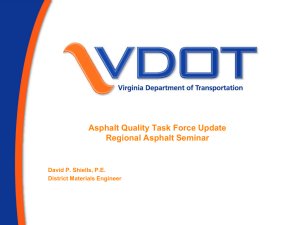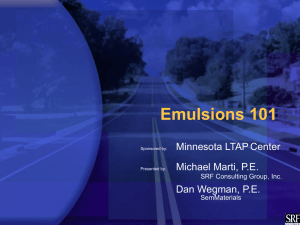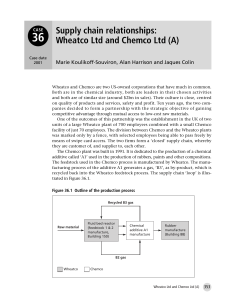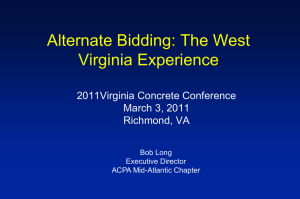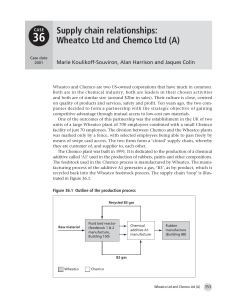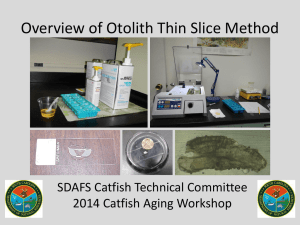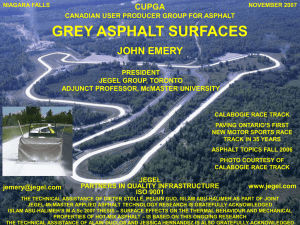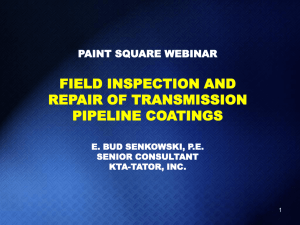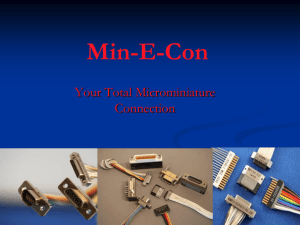Epoxy Asphalt presentation
advertisement
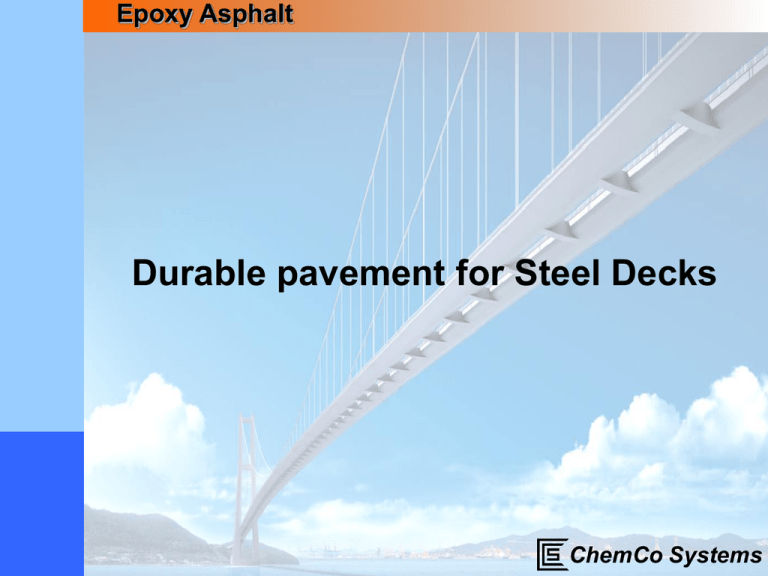
Epoxy Asphalt Durable pavement for Steel Decks ChemCo Systems Epoxy Asphalt History late 1950s Shell Oil develops jet fuel and hydraulic oil resistant paving for airport taxiways. 1966 Caltrans uses Epoxy Asphalt on San MateoHayward Bridge (in use). 1976 Bay Bridge 18mm overlay on lightweight concrete (in use). 1984 Golden Gate Bridge redecked (in use). 2000 2nd Nanjing (first Asia project). --5th generation product used for the first time ChemCo Systems Epoxy Asphalt Applications Orthotropic steel decks • New construction • Replacement paving • Re-decking Overlays Temporary chip seals • Lionsgate Br For replacement deck panels High (heavy weight) traffic, strategic roads with long life requirement Fuel and chemical resistant paving ChemCo Systems Epoxy Asphalt EA Chemistry Epoxy cross-linked polymer: continuous phase, asphalt: discontinuous phase 2 component binder and 2 component bond coat • Part A Resin • Part B Asphalts and cross-linkers Ambient temperature reactive cure mechanism Cured polymer is thermoset (won’t melt) ChemCo Systems Epoxy Asphalt Properties Element meshing Extremely high fatigue resistance High strength bond coat • Protects against delamination • Ensures composite action with steel • Resists high summer deck temperatures Thermoset • Will not melt Higher modulus than other flexible pavements • Reduces deck deflection “Epoxy Asphalt has a fatigue life of 2 to 3 orders of magnitude greater than the PG76-22 I-5 mix…”. --Rutgers University study ChemCo Systems Epoxy Asphalt Properties Does not oxidize (like all other asphalts) • No embrittlement upon aging Low voids (typically ~2 %) • Water impermeable • No chloride ion penetration • No corrosion--no membrane required High Temperature bond performance FHWA OECD Long Lived Pavement Study Turner Fairbanks Highway Research Center ChemCo Systems Epoxy Asphalt Fundamental difference HMA Asphalt, SMA, Gussasphalt, PMA are thermoplastics: will melt Epoxy Asphalt is thermoset: will not melt “Epoxy Asphalt concrete has shown excellent performance including anti-cracking feature under low temperature, stability under high temperatures and oil-corrosion resistance.…” --W. Wang, Chang’an University ChemCo Systems Epoxy Asphalt Advantages --Rutgers Univ. Low permeability prevents deck corrosion Fatigue resistance minimizes cracks 4+ times more stability than standard AC Handles truck wheel overloads (common in Asia) ChemCo Systems Epoxy Asphalt Advantages No rutting or shoving Use standard AC paving equipment • Very high bond strength • Paving placement is fast Won’t delaminate “The superior oxidation resistance of the epoxy asphalt material was even more obvious in the Cantabro tests…” --Transit New Zealand—OECD report ChemCo Systems Epoxy Asphalt Typical new construction detail ChemCo Systems Epoxy Asphalt EA Specifications Dense graded mix, ½” (12mm) minus • Basalt rock for skid resistance and long wear Low temperature paving (110121ºC) • Time/temp monitoring is critical QC element • Similar temps to warm mix Lab simulation (fatigue testing) advised for unique decks ChemCo Systems Epoxy Asphalt O-T Deck Pavement Stress from wheel load deflection TENSION Longitudinal stiffener ChemCo Systems Epoxy Asphalt Fatigue testing evaluate pavement design on project specific deck Keys • Realistic paving composite specimens • Good tests take time • Research performance of local materials (aggregates) • Use environmental chamber to control extreme temps ChemCo Systems Epoxy Asphalt Comparison: EA vs. polymer modified AC or SMA Properties Condition High temperatures Permeability Epoxy Asphalt Polymer AC Will not melt Melts None measurable Changes with age a. Will not oxidize b. Flexibility constant No age related performance losses a. b. Oxidizes Flexibility declines Delamination potential Very low Consistent composite behavior High Fuel resistance High Low—will soften and dissolve binder Rutting, shoving Stable Unstable under high temps and loads ChemCo Systems Epoxy Asphalt Chinese standard deck detail Fatigue test specimen with 3 pt. dynamic load on 300 mm center 300 mm stiffener spacing 12 mm deck plate (prior to 1999) 14 mm deck plate (after 1999) 50-55 mm EA paving Locus of highest stress is over stiffeners, particularly in truck lanes Dynamic fatigue test is good predictor ChemCo Systems Epoxy Asphalt Asian conditions High deck temps • To 90 °C Extreme temperature cycle between winter and summer Construction QC varies widely Standardized deck design in mainland ChemCo Systems Epoxy Asphalt Asian conditions Consistent very high truck wheel overloads • To 120 MT on 18 wheelers • SMA and gussasphalt sometimes fail as quickly as 2-3 yrs. SuTong Br. ChemCo Systems Epoxy Asphalt EA: Disadvantages Time and temperature controls critical • Controls can lead to higher quality and uniformity • Paving plant needs to be within 45-50 minute drive Too complicated • Over 35 bridges in Asia in past 10 yrs successfully completed – including 1st suspension bridge in Viet Nam • ChemCo provides advisors • Use test section in convenient location to train local paving crews before deck placement Costs more • Cost difference dwarfed by frequent closures and repaving Thuan Phuoc Bridge DaNang, Viet Nam ChemCo Systems Epoxy Asphalt Next in N. America Fremont, Portland 2011 • Repave in July San Francisco-Oakland Bay ~2012 • Single anchored suspension (new East Span) MacDonald, Nova Scotia ~2015 • Redeck similar to Lionsgate ChemCo Systems Epoxy Asphalt Future Reduce pavement weight Local manufacturing OECD-ECMT Joint Transport Research on long life pavements • (U.S., U.K., France, Germany, Denmark, New Zealand, Australia) • Open graded performance benefits demonstrated Improve fatigue performance in most challenging applications • Decks with extremely high wheel overloads • Decks with thin plates (12 mm) • Hottest tropical environments ChemCo Systems Epoxy Asphalt Conclusions Design, test and confirm for wear course success Epoxy Asphalt, a thermoset material, performs on challenging decks Epoxy Asphalt offers life cycle cost benefits Asian lessons learned • Over design surfacing when realistic data not available • Be flexible to adopt local improvements ChemCo Systems Epoxy Asphalt Thanks for your interest! ChemCo Systems

